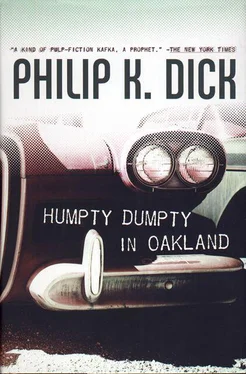Neither of them were smiling at him now; Al’s bitter grin was gone, and Lydia’s glassy fixed Greek smile was gone, too. Al had begun to look depressed. He scraped his shoe against the floor and fingered the edge of his jacket; he began zipping and unzipping his jacket. It seemed to the old man that Lydia had begun to draw away. Her face was blank. As if she could no longer bear the situation; it was too much for her. And, seeing that, he felt triumph; he felt the victory.
“Listen,” he said, “neither of you ever even seen it. So what do you know about it? Did you go over to Marin County?” They did not answer. “Just me,” he said. “You’re talking about something you never even saw.” To Lydia he shouted, “And you never met Mr. Harman either, so you don’t know anything at all.”
They gazed back, without answering. He had the floor.
“You better come take a look at it,” the old man said to Al. “You drive over there and take a look.”
“Hell,” Al said, “I don’t want to see it. I’m just giving you advice. My advice.”
“Sure,” the old man said. “Just advice. You won’t go look; you know if you see it you’ll admit you’re wrong.” He wheezed with exultation; he had them, both of them. “I been in business a long time, a lot longer than you. You’re just a bum. A bum who sits around. You know what you do? You—” He broke off.
“I sell used cars,” Al said in a wooden tone.
“To colored,” the old man said.
Al was silent.
“And that’s all you’ll ever be,” the old man said.
“I got a couple of irons in the fire,” Al said.
“At least you’re not crazy,” the old man said, laughing. “Isn’t that right?”
Al glanced up at him.
“Like me,” the old man said.
Al shrugged.
“You can come and visit me while I’m sitting up there,” the old man said. “In my new auto garage with the mechanics. Everything spic and span.”
“Okay,” Al said. He seemed to have no energy now. No more willingness to fight.
Lydia slipped from the room. Back, probably, to the kitchen or her bedroom; anyhow she was gone. Only the two of them remained.
“Off to a seminar,” the old man said.
“What?” Al murmured.
“Off to class.”
Al said, “Well, I better get going.”
“See you,” the old man said.
His hands in his pockets, Al moved off toward the hall and the front door.
“Don’t look so depressed,” the old man called after him. “Cheer up.”
“Sure,” Al said, turning. “Lots of luck,” he said.
“Same to you,” the old man said.
Al opened the front door. He hestitated, started to speak, and then shut the door after him. Presently the old man heard the front door open again, stealthily. She’s going after him, he said to himself. At that, he laughed with delight. Sitting on his couch in his bathrobe he laughed to himself, thinking of Lydia and Al conferring in secret outside on the front porch, trying to figure out how to do something. Find some way to stop him.
* * *
As Al Miller opened the door of his car he heard a voice behind him. Lydia Fergesson came hurrying down the steps and across the sidewalk. “Listen, Mr. Miller,” she said. “Just a moment so that I can talk to you.”
He seated himself behind the wheel and waited.
“I depend on you,” she said, her black eyes fixed on him.
“Hell,” he said, “I can’t do anything.” He felt anger and futility. “Do it yourself.”
“He would never have told me anything,” she said. “He never said a word, only about his fall; he would go on and give his money away to the crook with no word to me ever, and leave me with nothing. That is how he feels about me.”
Al closed the car door, started up the motor, and drove away.
Why the hell did I go over there? he asked himself. Why didn’t I stay home?
They’re both nuts, he said to himself.
How’m I going to get out of it? I have my own problems. Let them take care of theirs. I don’t have the time. I can’t even solve my own problems; I can’t even get anywhere with them, and they’re really simple. All I need to do is find another location for Al’s Motor Sales.
And then another thought came up from deep inside him; he had not been aware of it, but it had been there nevertheless. I hope he does get swindled, he thought. I hope Harman takes him for everything he has. It’s exactly what he deserves, what the two of them, him and that crazy Greek wife, deserve.
What I ought to do is find some way to swindle him myself. That was it; that was really it.
He had worked with Jim Fergesson for years, and surely if anyone deserved to get the money it was he, Al Miller, not some well-to-do customer driving a Cadillac who knew the old man only as the guy who greased his cars. I know him better than anyone, Al said to himself; I’m his best friend. Why does it go to Harman and not me?
He thought, But if I tried to swindle the money from the old man, I’d foul it up and land in jail. There’s no use even trying to; I can’t swindle the old man or blackmail Harman. I just don’t have the talent.
Why can’t I be like him? he asked himself. I’m a failure, and Chris Harman is what I ought to be; he’s everything I’m not.
But, he wondered, how do you get to be like that?
TheFe was no easy way. As he drove along the street, Al Miller sorted through every possible way; how did a person like himself become a person like Chris Harman? It was a complete mystery to him. A riddle.
No wonder everyone looks down on me, he thought.
What I’ll do, he decided, is go by Harman’s house, and when he comes to the door I’ll tell him I want to go to work for him. I’d like to be a dirty-record salesman. I’ll tell him that. He can find something for me; if not that, then something else. I can repair the pressers that make records. Or I can work at his house, on his cars; he doesn’t have a mechanic now. I can devote all my time to his Cadillac and his Mercedes-Benz, polishing them and greasing them and aligning the front ends.
What I ought to do, he thought, is show some real ambition and make up something really good; I could tell him, for instance, that I have a mystical ability, that I can heal sick cars, or sick record-pressers. It’s done by a laying-on of hands. Or by singing. Something that’ll really attract his attention. Isn’t that how the great Americans in the past made it? They all had a flair. When they were, say, nineteen years old they got into Andrew Carnegie’s office for one minute and they told him they never saved string, or that they charged twenty-five dollars an hour for their time. That did the trick.
I have to get it exactly right, he told himself. I have to think until I come up with the really terrific new idea that will swing it. Anything less and I am doomed; I’ll go on like I am, and never be anything more than I am.
This is my chance to break out and be something.
My whole life, he told himself, my whole future, depends on it. Can I do it? I have to. I owe it to Julie, and to myself; in fact, to my family. I can’t wait any longer; I can’t go on drifting like this. This is opportunity knocking, this guy Chris Harman; this is the way it’s been set up and if I ignore it I’ll never be given another chance. That’s the way it always is.
And then something else occurred to him. I think I’m out of my mind, he thought. That whole business in there, that argument with the old man, drove me crazy. I’m out of my skull.
And yet there was something in the idea. What would I be like, after working around Chris Harman for a while? he asked himself. He might give me something really good. Probably he’s got his hands into so many enterprises that he’s got plenty of jobs to dole out; he probably employs hundreds of people.
Читать дальше










